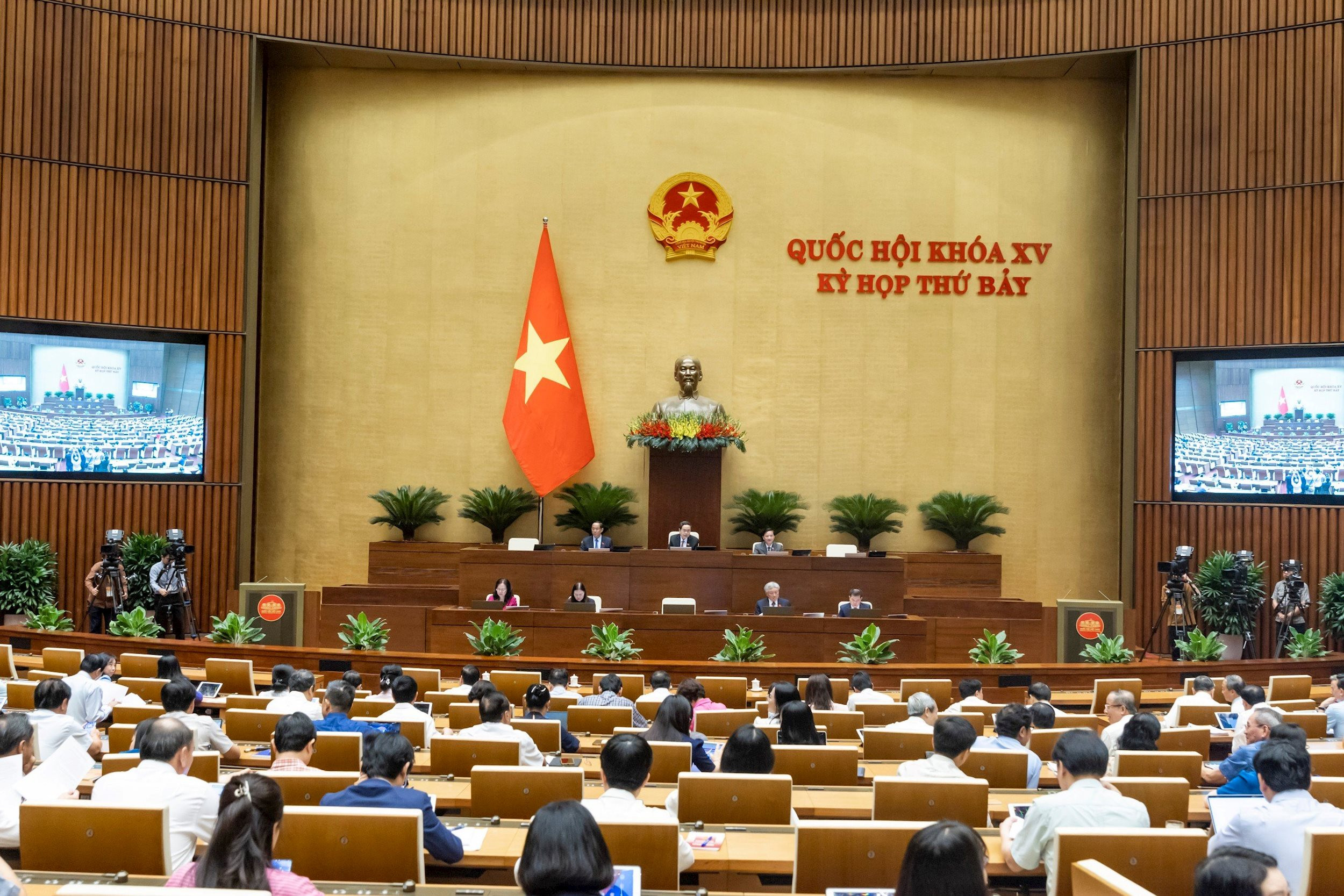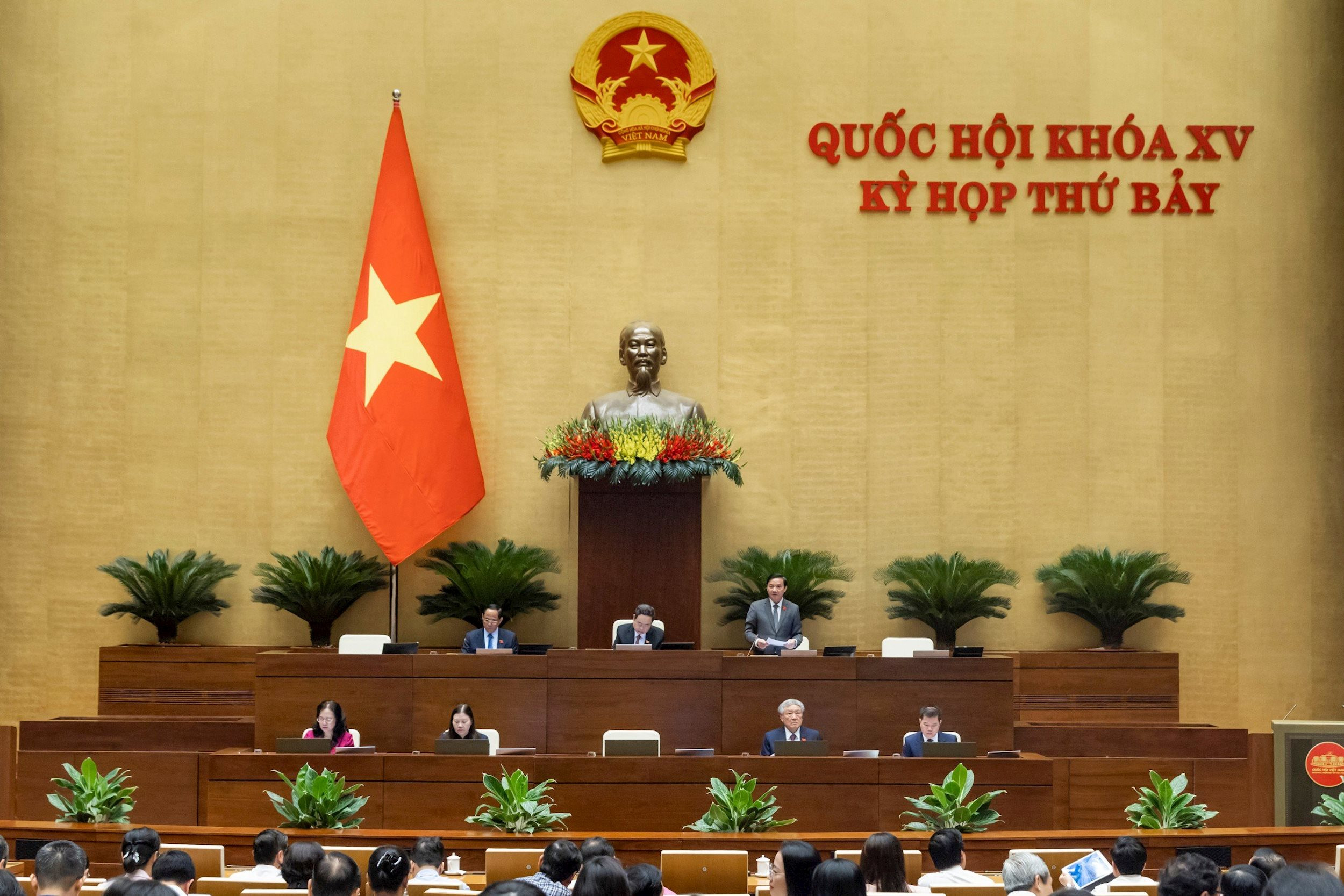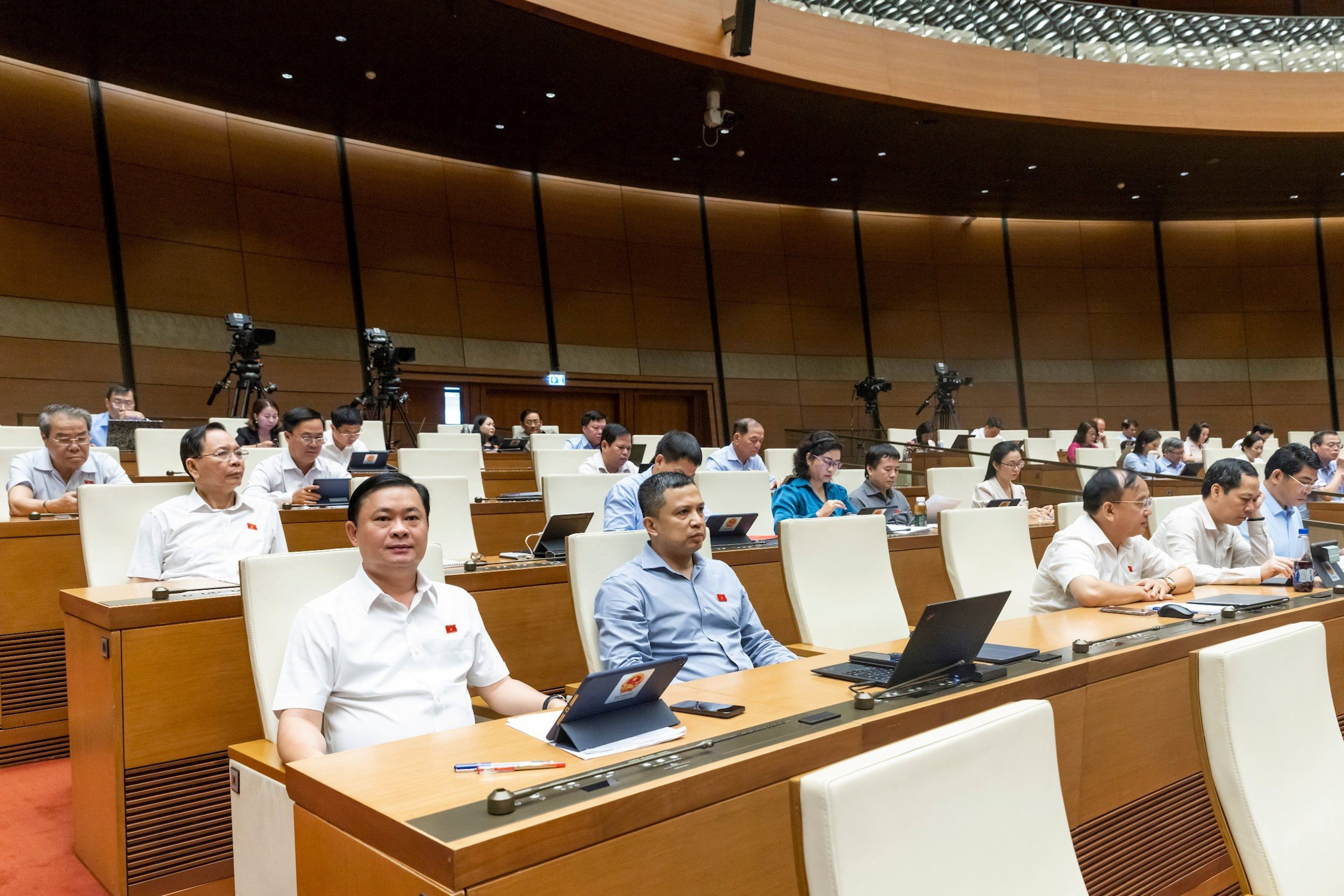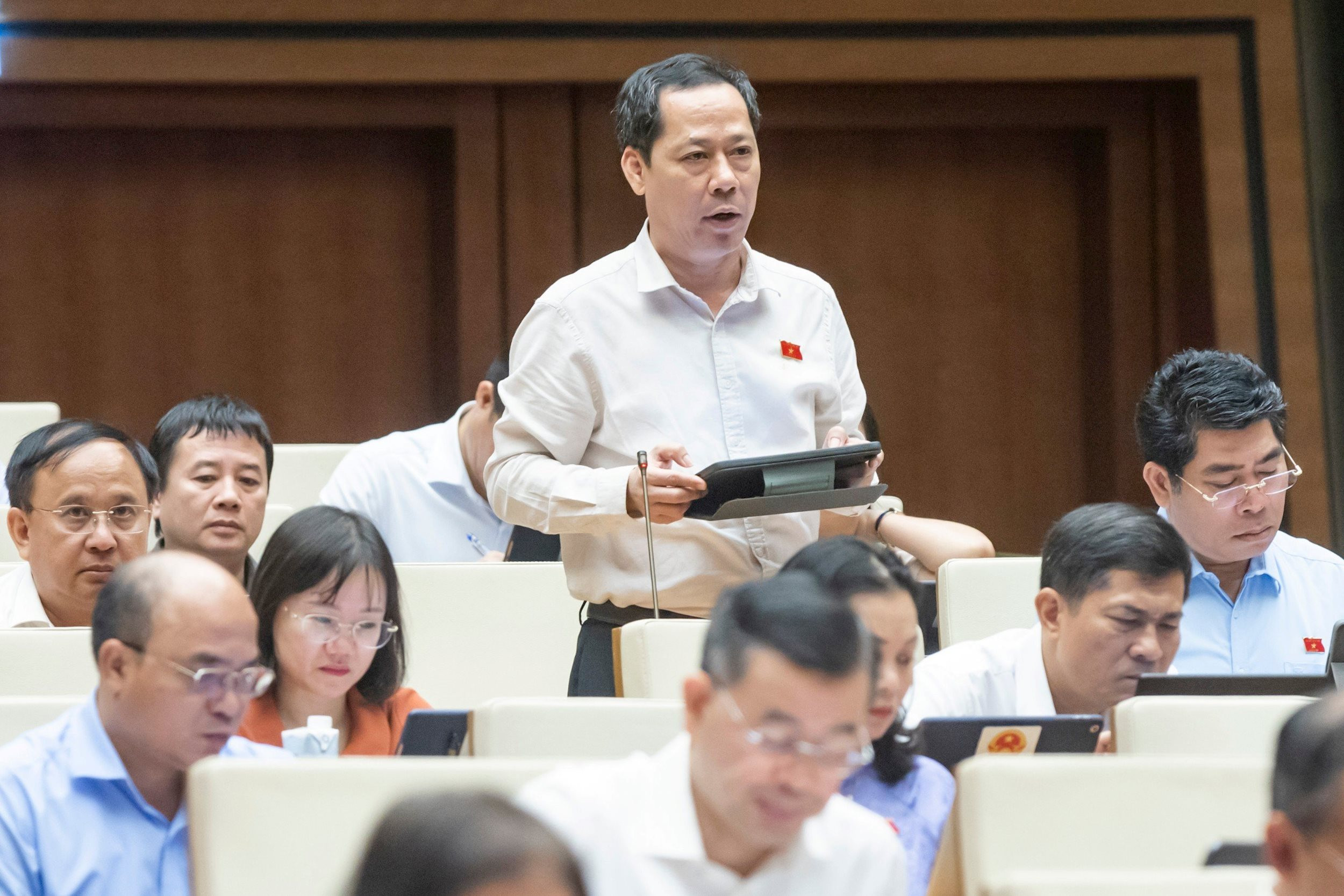National Assembly Delegate of Nghe An: Clearly define the tasks of first instance and appeal trials
Delegate Tran Nhat Minh, Nghe An delegation, supports the regulation of organizing the People's Court of Appeal to replace the People's Court at the provincial level, and the People's Court of First Instance to replace the People's Court at the district level, because it is consistent with political and practical bases.
On the morning of May 28, continuing the 7th Session, the 15th National Assembly discussed in the hall a number of contents with different opinions of the draft Law on Organization of People's Courts (amended). Comrade Tran Thanh Man - Politburo member, Chairman of the National Assembly chaired the meeting. Comrade Nguyen Khac Dinh - Member of the Party Central Committee, Vice Chairman of the National Assembly chaired the meeting.

OVERCOMING THE SITUATION OF RELATIONSHIPS BETWEEN COURT LEVELS AS ADMINISTRATIVE RELATIONSHIPS
After listening to the report on explanation, acceptance and revision of the draft Law on Organization of People's Courts (amended) by Member of the National Assembly Standing Committee, Chairwoman of the National Assembly's Judiciary Committee Le Thi Nga, the National Assembly deputies spoke and discussed.
Delegate Tran Nhat Minh - full-time National Assembly Delegate of Nghe An Delegation expressed his high agreement with the amended and supplemented contents of the Draft Law on Organization of People's Courts (amended) submitted to the 7th Session this time.

To contribute to the further completion of the Law project, the delegate from Nghe An gave his opinion on two contents. First, on the reform of the Provincial People's Court and District People's Court according to the jurisdiction (stipulated in Clause 1, Article 4). Currently, the draft Law is proposing two options for the National Assembly to consider and discuss.
Provincial People's Court: Option 1: Provincial and municipal People's CourtCentrally-governed city (retain as current). Option 2: People's Court of Appeal.
District People's Court: Option 1: District, county, town, city and city People's Courts under the province and city under the central government (remain as current). Option 2: First instance People's Court.

Speaking at Dien Hong Hall on the morning of May 28, delegate Tran Nhat Minh said that he personally supports option 2 as proposed by the Supreme People's Court (stipulating the organization of the People's Court of Appeal instead of the People's Court at the provincial level, the People's Court of First Instance instead of the People's Court at the district level), because it is consistent with the political and practical basis.
Regarding the political basis, the full-time delegate of Nghe An delegation cited the policy in Resolution No. 27-NQ/TW dated November 9, 2022 of the 13th Party Central Committee on continuing to build and perfect the socialist rule-of-law State of Vietnam in the new period.

In particular, Resolution No. 27-NQ/TW sets out the key strategic task that needs to be focused on, which is "promoting judicial reform, ensuring the independence of courts according to jurisdiction, judges and jurors trying cases independently and only obeying the law".
“To specify this focus, Resolution 27 clearly states the tasks and solutions of "Perfecting the mechanism to overcome the situation where the relationship between the Court levels is an administrative relationship, ensuring independence between the trial levels and the independence of judges and jurors when trying. Clearly defining the tasks of first-instance and appeal trials...", said Mr. Tran Nhat Minh.
This delegate added that this spirit is consistent throughout the Party's direction of judicial reform, reflected in Party documents. Therefore, choosing option 2 is to concretize the Party's Resolutions and documents on this issue.
However, through discussion, there are still issues that some National Assembly deputies are concerned about. That is, the reform of the Provincial People's Court into the People's Court of Appeal, the District People's Court into the People's Court of First Instance according to the jurisdiction, but the tasks and powers of these Courts remain unchanged. The People's Court of Appeal still hears some cases at first instance.
To help dispel concerns, the delegate from Nghe An cited practical data to strengthen the basis for his chosen option.
That is from the report of the Supreme People's Court showing: "Currently, the District Court is the place to resolve and try under first instance procedures over 90% of cases that must be resolved by the Court", that is, the Provincial People's Court only tries under first instance procedures about 10%, the rest are mainly tried under appeal procedures.
Not to mention, if the establishment of specialized People's Courts of First Instance is approved by the National Assembly at this session, a large number of first-instance administrative cases under the jurisdiction of the Provincial People's Court will be transferred to the Specialized People's Court of First Instance for Administrative Trials.
Furthermore, in the Submission on the draft Law on the Organization of People's Courts (amended) No. 191/TTr-TANDTC dated October 2, 2023, the Supreme People's Court stated: "This provision is consistent with the long-term development orientation of the Court. In the coming time, we will continue to propose increasing the authority of the People's Court of First Instance when the agencies conducting the proceedings at the first instance level have sufficient capacity to investigate, prosecute, and try all types of cases. The People's Court of Appeal will have the main task of trying cases according to the appellate procedure."
According to Plan No. 81/KH of the National Assembly Standing Committee on implementing Conclusion No. 19/KL-BCT of the Politburo and the Project on orientation of the law-making program for the 15th National Assembly term, the Criminal Procedure Code and the Law on Organization of the People's Procuracy are included in the research and review program.
Therefore, the fact that the People's Court of Appeal (if this option is approved by the National Assembly) still tries a number of cases at first instance is only a transitional step in the process of implementing the goals by 2030 of Resolution 27.
"Therefore, in my opinion, the reform of the Provincial People's Court and District People's Court according to the jurisdiction as proposed by the Supreme People's Court in the current period is appropriate" - delegate Minh said.
ENSURE HUMAN RIGHTS AND CIVIL RIGHTS OF DEFENDANTS AND LITIGANTS
Regarding the regulations on participation and information activities at court sessions (Article 141), the draft Law currently offers two options.
Participants in court sessions and meetings must comply with the provisions of law and the rules of court sessions and meetings.
* Option 1 (clauses 3 and 4):
3. Recording the speech and images of the Trial Panel at a trial or meeting must have the consent of the Presiding Judge; recording the speech and images of other litigants or participants in the trial or meeting must have their consent and the consent of the Presiding Judge. Recording images at a trial or meeting may only be done during the opening of the trial or meeting and the pronouncement of the verdict and announcement of the decision.
4. The court shall record the speech and images of the entire proceedings of the trial or meeting if necessary to serve professional duties. The use and provision of the results of the recording of speech and images of the proceedings of the trial shall be carried out in accordance with the provisions of law. The Chief Justice of the Supreme People's Court shall specify this clause in detail.
* Option 2: Do not stipulate clauses 3 and 4 (implement according to the provisions of procedural laws and relevant laws).
Delegate Tran Nhat Minh expressed his basic approval of option 1 because, on the one hand, it overcomes the shortcomings of current procedural laws; on the other hand, it meets two requirements for information activities at court.
One is,must not affect the human rights and civil rights of the defendant, the litigant and other participants in the proceedings. According to Article 31 of the Constitution, "A person is only considered guilty until a court verdict has come into legal effect."
Accordingly, even when brought to trial, the defendant is not yet considered guilty, so they must be treated as innocent. For civil, divorce or commercial cases, directly related to private life, personal secrets, family secrets, business secrets.
During the process of proving at the trial, the information provided by the parties has not been verified. This information must be evaluated and concluded by the Trial Panel in the judgment. Therefore, the recording and filming at the trial must strictly comply with the provisions of the law and must ensure the human rights and civil rights of the defendant and the litigant.
Second,must not affect the trial activities, must ensure that the Trial Council is fully focused on the trial work.
To fully implement the above 2 requirements, the delegate said that not only for the recording activities as shown in the draft, but also suggested adding the phrase "recording" to the end of paragraph 3. Specifically as follows: "... Recording and recording images at court sessions and meetings can only be done during the opening of the court session, meeting, and the announcement of the verdict and decision"./.


